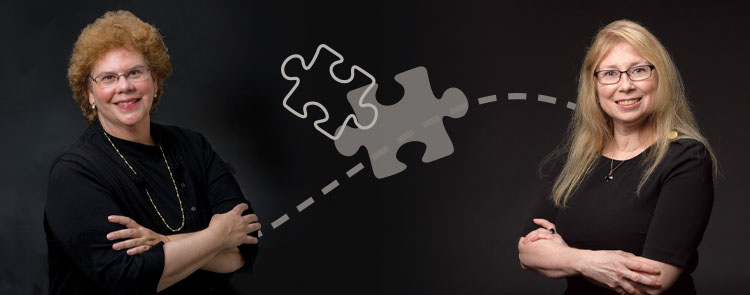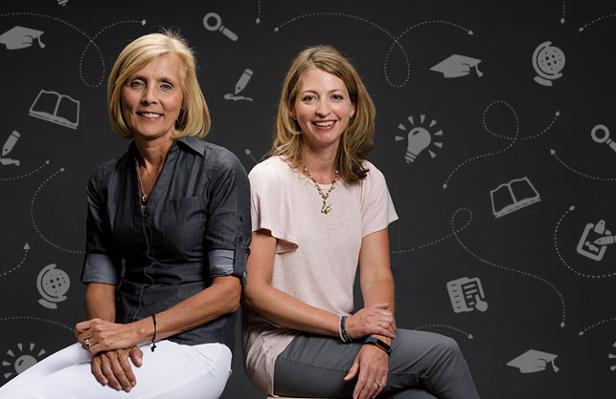PhD path is personalized, walked with mentors
Written by Elizabeth Gardner
No two paths to a Purdue doctor of philosophy in nursing are identical, but all are marked with transdisciplinary collaboration and illuminated by a mentor every step of the way.
Purdue Nursing PhD students receive guidance from experts in nursing and other areas across the University including the Center on Aging and the Life Course (CALC), and departments within the College of Health and Human Sciences — equipping graduates with the research knowledge and skills to lead transdisciplinary teams, contribute to nursing science, and improve health care at both the individual and population level.
The new program is Purdue’s answer to the national call to address the shortage of nurses with PhDs, which currently stands at less than 2% of all nurses. In its third year, Purdue’s is one of only two nursing PhD programs in Indiana.

Melissa Kovich and Kimberly Porter are two of the current cohort of talented nurses pursuing their doctorates and following their path to becoming nursing scientists and scholars.
Researcher and role model
“I hope to show my daughters that if you want something and work hard for it, you can achieve it,” says Melissa Kovich, a Robert Wood Johnson Foundation Future of Nursing Scholar who is mother to three girls. “Nurses offer a different perspective from most research scientists. We are trained to look at people holistically, to be a patient advocate and are positioned in the center of a health care team including different specialties. We can drive research that will really help people.”
"The diversity of my committee has helped me tremendously. Their expertise spans data analysis, statistics, engineering and nursing, and it has elevated my education."
Melissa Kovich
Third-year nursing PhD student
Kovich, who worked as a family nurse practitioner before becoming a full-time PhD student, is beginning her third and final year in Purdue’s program. This is the year she transitions from coursework to a focus on research and writing her dissertation, under the guidance of Vicki Simpson, an assistant professor of nursing. The connection between well-being and academic success in young adults is the focus of Kovich’s research. It aligns well with Simpson’s expertise in lifestyles that support well-being in the elderly population.
“Our research pursuits really complement each other, and combined will provide a much more complete picture of the connections between well-being and mental and physical health,” Simpson says. “Melissa brings enthusiasm and creativity to her research project. She has life experience that makes her a well-rounded and highly motivated student.”
Well-being’s wide influence
Kovich is mining a large dataset collected from a survey distributed to undergraduate students at Purdue and peer institutions, rich with information about the student experience at a research university. She is using the data to test the PERMA model, which looks at positive emotions, engagement, relationships, meaning and accomplishment as the building blocks of happiness and well-being.
“I want to see if the data supports the theory and if academic success can be predicted by well-being,” she says. “Ultimately, I want to develop interventions — healthy behaviors that will increase well-being and wellness.”
She also will examine some of the barriers to happiness — such as stress, anxiety and depression — in the undergraduate population.
“In life, a lot of people say ‘when X happens, I’ll be happier,’ but this may be all wrong,” Kovich says. “Perhaps well-being needs to be the first priority and the success will start to flow after it is in place. The young-adult period is a good time to learn and put these practices in place for a healthier life.”
Cross-disciplinary collaboration
Kovich’s committee of doctoral advisors also includes Rhonda Phillips, dean of the Purdue Honors College; Karen Foli, associate professor of nursing; and Zachery Hass, who has a dual appointment in nursing and industrial engineering. Kovich also began working about a year ago with Andrew Zehner, an assessment and data analyst in Purdue’s student affairs office.
“The diversity of my committee has helped me tremendously,” Kovich says. “Their expertise spans data analysis, statistics, engineering and nursing, and it has elevated my education.”
Kovich has formally met with her full committee around four times. In her first two years of the program, she spent four days on campus, and she regularly meets and communicates with Simpson. Kovich also attends conferences recommended by Simpson and those on her committee.
“There really is no typical week, which is part of what keeps it interesting for me,” she says. “I’m always in touch with Professor Simpson, who has guided me through the program, reviews my work and plan of study, and connects me with individuals and information that hone my skills and expand my understanding of my research area.”
A seat at the table
Doctorally prepared nurses are in demand as faculty to educate the next generation of nurses, serve leadership roles in health care organizations, and as researchers with a different perspective from most STEM disciplines, says Karen Foli, associate professor of nursing and director of Purdue’s PhD in Nursing program.
“Nurse scientists and scholars are needed to generate knowledge that leads to best practices in education, policy, the bedside and workforce,” she says. “Nurses have a better understanding of the patient and issues on the front line than other disciplines. We have the power to effect important change in health care practice, and we need a seat at the table.”
Purdue offers an immersive program with intense mentorship from experts in nursing and in external fields within a top-tier research institution. Full-time students can complete the program in three years.
“Health care is delivered in the context of collaboration, and Purdue is a leading institution in team science,” Foli says. “In addition to leveraging Purdue’s campuswide strengths, the program stands out for its flexibility and creativity. Students are able to tailor the program to their individual research interests. We have a rich infrastructure in place to support our PhD students.”
Balancing research and practice
Porter is a part-time PhD student who continues to work full-time as a family nurse practitioner.
“My dream job is to be a faculty member who spends two days a week in clinical practice,” says Porter, who is in her third year of a five-year program. “I want to pursue research, educate the next generation of nurses and also be a practicing nurse practitioner.”
Porter began her career in management and redirected to nursing. She earned bachelor’s degrees in psychology and nursing, and a master’s degree in nursing from Purdue.
“I’ve worked in many states, and the Purdue School of Nursing has an excellent reputation,” she says. “It offers a strong education and great support for students. I keep coming back because it is the perfect fit for me.”
When not pursuing her PhD studies or working, Porter enjoys walking her two mastiffs and spending time with her extended family. Two of her nephews have Autism Spectrum Disorder (ASD), which sparked her research focus on primary care for those on the spectrum.
“I see my nephews growing and heading into adolescence and adulthood, and it made me think about what could be done to aid this transition,” she says. “This area really brings research and practice together and highlights how nurses can use our caregiving connection to focus on the human aspect of science.”
Improving ASD patient communication
Through her work in primary care, Porter sees the need for a better understanding of patients with ASD.
“There has been no health theory developed that describes this population, and my goal is to develop research-proven guidelines of how to best serve patients with high-functioning ASD,” she says. “These patients have a high intellect, varying degrees of communication and social abilities, and are more self-focused. They also have an increased risk of diabetes, Crohn’s Disease, obesity, attention deficit disorder and anxiety. If we are using guidelines based on the social norm model, which is standard for the non-ASD adult population, it won’t be effective for this population.”
Porter has developed a concept combining theories and based on the premise that high-functioning ASD adults use their own perception more than social norms to guide their health care choices. Through her thesis work, she hopes to find support for the concept. Eventually, she hopes to determine how this population makes health care decisions and to also recommend interventions that improve care. Her work has been under the guidance of Professor Foli.
“Kim is a remarkable student, eager to gain new skills and has gone after opportunities beyond those required,” Foli says. “She worked on unrelated research with Nicole Adams, a clinical assistant professor of nursing, in order to gain experience in research interviewing techniques. She took this as an independent study to better prepare herself for her own qualitative research.”
Foli sees her role and that of other mentors as a steward, offering advice on things like plans of study, timelines, conference and grant opportunities, and research methodologies. She sees the mentor role extending to shaping the students’ careers, not merely their doctoral studies.
Intense, but rewarding
As a nurse practitioner, Porter works four extended-hour days, leaving one day for her nursing classes. She manages studying, meetings ,and reviews around that schedule and devotes weekends to her PhD work.
“A big surprise was coming from a clinical master’s degree to the PhD program,” Porter says. “The master’s program was very structured and specific — regular tests and prescribed homework and deadlines. The path to a PhD is much more of a thinking process. It is not as black and white.”
Porter credits Foli with keeping her on the best path for her research and career goals, helping her figure out which classes to take in what order to gain knowledge and not be overwhelmed, she says.
“Dr. Foli knows how to lay the path so that I am growing and moving in a positive direction,” Porter says. “Purdue’s program is fantastic because all Nursing faculty and staff are supportive and willing to help the students. They are internationally recognized for their achievements, but they will take the time to help you grow and develop. You couldn’t ask for a better group of nurses to help you achieve your dreams.”
TAKE A STEP ON YOUR PATH TO A PhD IN NURSING
Contact Reanne Hall, graduate program coordinator, at Gradnursing@purdue.edu.
